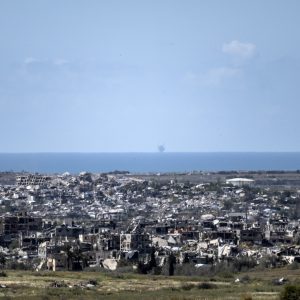Dismantling UNRWA will be ‘catastrophic’ for Gaza and Palestinians: Expert
With Israel’s ban on the agency set to take effect this month, Jogen Jensehaugen warns that no other aid group has the capacity to fill the gap
LONDON- (AA)
The dismantling of the UN Relief and Works Agency for Palestine Refugees (UNRWA) will have “catastrophic” consequences for the vulnerable population in Gaza and other Palestinian territories, a prominent expert has warned.
Jorgen Jensehaugen, a senior researcher at the Peace Research Institute Oslo (PRIO), emphasized that UNRWA has long been regarded as the “backbone of the humanitarian operation” across the region.
UNRWA is “probably the most important actor on the ground, in terms of providing shelter, in terms of setting up camps, in terms of providing food aid, in terms of providing healthcare,” Jensehaugen said in an interview.
Established in 1949, UNRWA has been central to the welfare of Palestinian refugees across Gaza, the West Bank, East Jerusalem, Lebanon, Jordan, and Syria.
In Gaza, however, its role is particularly significant. Jensehaugen highlighted that even though other organizations like the World Food Program (WFP) supply aid, it is UNRWA that manages the critical logistics, handling storage, distribution, and coordination with other agencies.
“They have the deconfliction apparatus, the warehouses, the staff on the ground, and the distribution networks,” he explained.
If UNRWA is unable to operate, it will be extremely difficult for other humanitarian agencies “to take over or operate in any meaningful way, because the core of the operation that they depend on will basically break,” he added.
Israel’s parliament, the Knesset, passed legislation in October targeting UNRWA, accusing the agency of colluding with Hamas. These allegations, denied by UNRWA, have been repeatedly raised by Israel since October 7, 2023.
The ban imposed on UNRWA operations is scheduled to take effect in late January.
In response, UNRWA Commissioner-General Philippe Lazzarini told the UN Security Council that the agency remains the “backbone” of humanitarian operations in Gaza. He condemned the “insidious campaign” by Israeli authorities aimed at pushing UNRWA out of the occupied Palestinian territories.
Lazzarini warned that undermining the agency would not only worsen the humanitarian crisis but could also destabilize the broader region.
Speaking about the immediate impact of dismantling UNRWA, Jensehaugen broke it down by region: East Jerusalem, West Bank, and Gaza.
“In East Jerusalem, basically UNRWA will be illegal, meaning they will be kicked out of the city,” he said.
The agency’s headquarters would be forced to close, international staff would be withdrawn, and schools in refugee camps would shut down, he explained.
A possible transition could involve moving Palestinian students into Israeli schools, but Jensehaugen warned that losing UNRWA’s leadership would cripple operations in the rest of Palestine.
The impact on the occupied West Bank remains less clear, said Jensehaugen.
“Israel is not making exactly clear how they’re going to operationalize this,” he said, adding that it will have longer term effects in the West Bank.
However, the long-term effects could be devastating, especially in education and healthcare services.
UNRWA takes care of the educational system for the refugees, and a lot of the health care, “so if that collapses, the big question is, will the Palestinian Authority be able to take it? Will they be willing to take it? Can they afford to take it? We just don’t know,” he said.
In Gaza, the dismantling of UNRWA would be “catastrophic,” Jensehaugen reiterated, warning that replacing the agency would take years.
“That is not the kind of time the population of Gaza have. They are in the most dire of circumstances already,” he said.
“If you take the current situation, and you unplug the most important lifeline, it’s disastrous. The problem is that if you take UNRWA out of this, there is just no other capacity that can fill that gap. So, even if other agencies want to do this job, they just don’t have the on-the-ground capacity.”
Taking out UNRWA, he said, “means that you’re just creating this vacuum, and you’re inserting nobody else to fill it.”
“Israel doesn’t trust UNRWA, but the population in Gaza trusts UNRWA … meaning that it’s rather relatively easy for UNRWA to do the distribution under very challenging circumstances,” he added.
Additionally, suggestions of using private security contractors to distribute aid have been floated, but Jensehaugen dismissed this idea as neither “feasible nor desirable,” warning that it would introduce new problems and likely worsen the situation.









